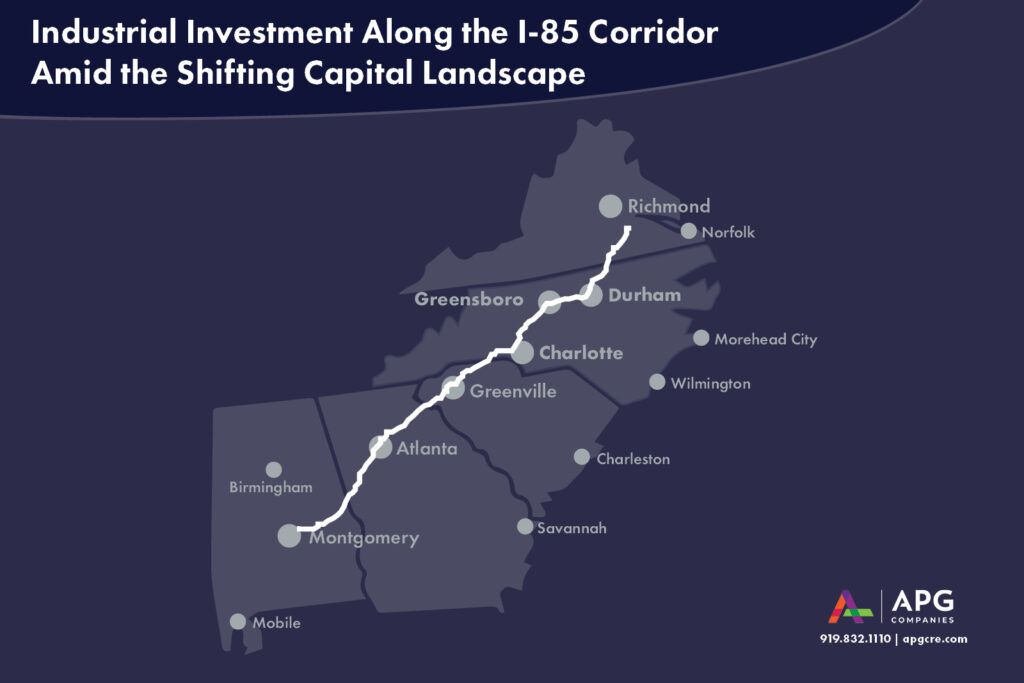How developers, investors, and lenders are adapting to tighter capital markets and evolving tenant demand from Richmond to Atlanta.
Stretching from Richmond, VA to Atlanta, GA, the I-85 corridor has long been one of the most active industrial real estate arteries in the Southeast. Anchored by distribution hubs like Charlotte, Greensboro, and Atlanta, and supported by the manufacturing resurgence in cities like Greenville and Durham, this corridor is a magnet for logistics, warehousing, and advanced manufacturing.
Yet, in 2025, the landscape is shifting. While leasing demand remains solid and population growth continues to fuel long-term optimism, a tightening debt and equity environment has forced market participants to adjust their strategies.
Capital Markets at a Crossroads
As interest rates remain elevated compared to pre-2022 levels, debt service costs have increased, and refinancing assumptions have grown more complex. A significant wave of loan maturities looms, with nearly $2 trillion in U.S. commercial debt set to come due between 2024 and 2026. Traditional lenders have grown more cautious, retreating from speculative projects and tightening underwriting standards.
In their place, non-bank lenders and private credit funds have stepped in. This shift has allowed deals to continue—albeit selectively—with a premium placed on in-place cash flow, credit tenants, and infill locations. For many borrowers, bridging the capital stack now requires creativity and a mix of sources.
Investment Activity: Disciplined, But Not Dormant
Despite the headwinds, investment sales volume in the industrial sector has seen a modest uptick—up 6% year-over-year. However, overall deal volume remains about 29% below the pre-pandemic average. Institutional buyers are returning cautiously, often targeting assets below replacement cost or those offering immediate yield.
Deals such as the five-building portfolio sale across Charlotte and Raleigh-Durham, and the fully leased asset in Salisbury, NC, show that capital is still moving—especially for stabilized, well-located properties. Infill submarkets in Charlotte and Atlanta continue to outperform, with investors betting on long-term fundamentals.
Development Trends Along the Corridor
New construction is adjusting in real time. After years of speculative building, developers are pivoting to build-to-suit projects or pausing altogether until leasing commitments are secured. In Greenville-Spartanburg, where over 15 million SF delivered in the past year, vacancy has edged up to 8.3%, prompting a slowdown in starts.
Still, tenant demand for modern space—especially for e-commerce fulfillment, cold storage, and EV manufacturing—continues to support a selective development pipeline. Markets like Union County, SC and Richmond, VA are seeing significant manufacturer-driven growth, backed by major announcements from Eaton and Isuzu.
Investor Mindset: Focus on Fundamentals
Across the corridor, equity remains available—but selective. Investors are prioritizing:
- Well-located, infill industrial product
- Long-term leases with credit tenants
- Access to labor and intermodal transportation
The shift reflects a broader return to fundamentals. While the go-go days of speculative capital may be on hold, core industrial assets remain in high demand from institutions, family offices, and private funds alike.
Outlook: Strategic Optimism
The Southeast—and the I-85 corridor in particular—retains its strategic appeal. Population growth, infrastructure investment, and proximity to major ports and distribution networks provide a strong foundation. But in 2025, capital is more cautious, and the underwriting bar is higher.
For stakeholders willing to navigate this new reality—through disciplined underwriting, strategic site selection, and creative capital structuring—the corridor still offers compelling opportunities. Industrial real estate hasn’t slowed down. It’s simply become more selective.
Onshoring of manufacturing and distribution facilities as being mandated by the new administration and likely future versions, will continue to drive industrial real estate demand and growth throughout the country. The runway for recovering USA-based facilities in capabilities is long, deep and wide.
Jim Anthony, Founder and CEO of APG Companies will join the panel of experts discussing industrial investment sales at the InterFace I85 Industrial Conference in Charlotte on May 19th and 20th. Like to join the conversation? You can register for the conference here.

